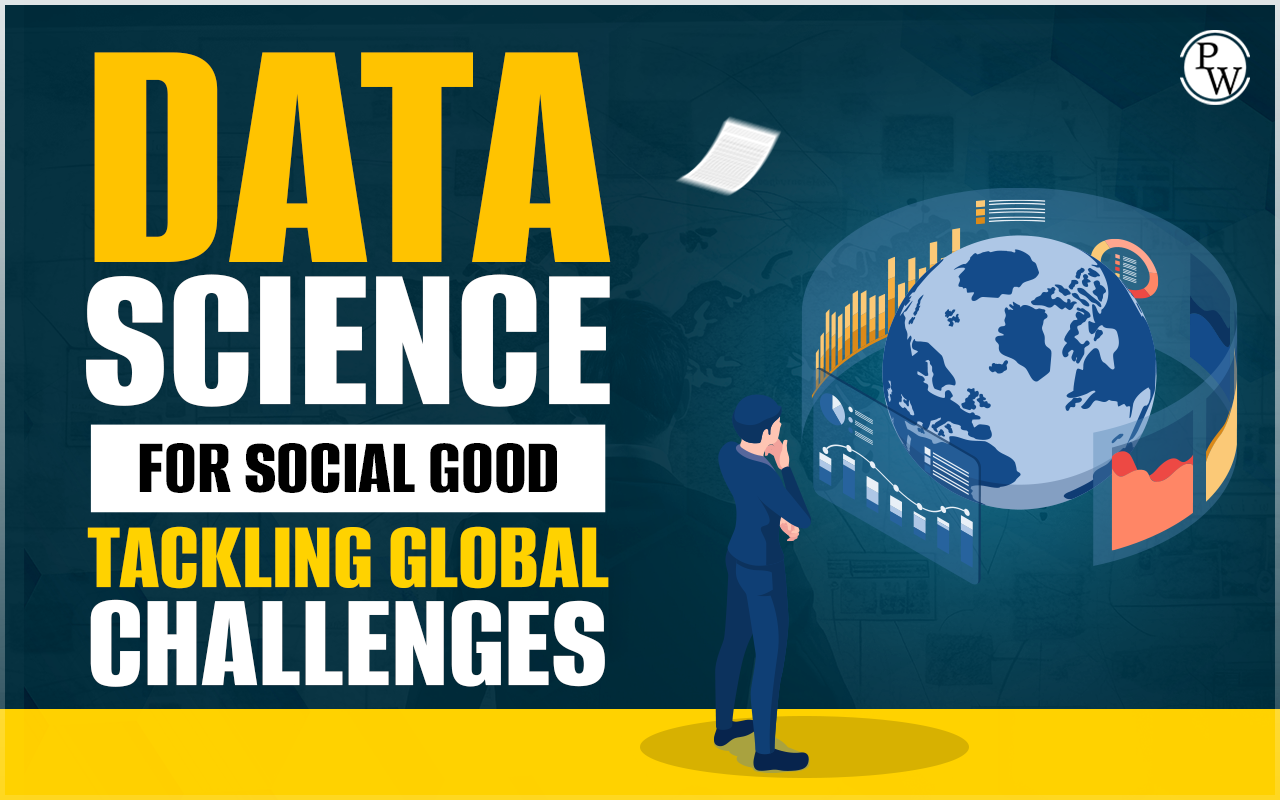Data Science for Social Good (DSSG) refers to applying data science techniques and methodologies to address societal challenges and promote positive social impact. Keep reading to know more!
Data Science for Social Good: Nobody can deny the shifts that our world has experienced over the past few years, with many of them having a considerable impact on societies and communities across the globe. From food insecurity to digital education, climate change to public health – challenges have been plentiful. But new technologies, like data science, have the potential to be an effective instrument for addressing these global concerns head-on and improving people’s lives. The area of data science for social good is growing in popularity as more and more driven individuals commit their expertise and abilities to employing data-driven solutions for social good.
In this blog post, we will explore what it means to use data science for social good along with all the ways it’s helping create meaningful impact throughout the world.
Data Science for Social Good Overview

Data Science for Social Good (DSSG) is an interdisciplinary field that harnesses the power of data science, machine learning, and artificial intelligence to address and solve complex social challenges. This emerging field uses data-driven insights and advanced analytics to create positive and impactful changes in public health, education, environmental sustainability, poverty alleviation, and more.
Ethical considerations play a crucial role in DSSG. Participants are mindful of the ethical implications of their work, ensuring privacy, fairness, and transparency in handling sensitive data and deploying solutions. Many DSSG initiatives involve community engagement, where participants work closely with communities affected by the social issues they are addressing. This fosters a deeper understanding of the challenges and ensures that solutions are contextually relevant. Some DSSG programs include educational components, offering workshops, training sessions, and mentorship to support participants in acquiring new skills and knowledge throughout the program.
What is Data Science for Social Good?
Data Science for Social Good (DSSG) is a field that leverages data science and AI techniques to address societal challenges and promote positive impact. Key aspects include:
- Interdisciplinary Training: DSSG programs, like the one at Stanford University, provide interdisciplinary training encompassing machine learning, data science, and AI.
- Community Building: Initiatives such as Data Science for Social Good foster communities that encourage responsible data science and AI practices for equitable social good.
- Project-Based Approach: Programs like the Data Science for Social Good Fellowship at Carnegie Mellon University offer a project-based summer program, enabling aspiring data scientists to work on real-world issues using their skills.
- Identifying Solutions: A resourceful data scientist can independently determine and address social challenges using available data, contributing to the broader goal of social good.
- Applied Research Training: Programs like the Data Science for Social Good at the University of British Columbia focus on applied research training, providing practical skills to create data-driven solutions for societal issues.
- Project-Based Training: Initiatives such as the Summer Programme at Imperial College London equip aspiring data scientists with the skills to develop data-driven solutions for real-world problems.
Data Science for Social Good Jobs
Jobs in Data Science for Social Good focus on leveraging data-driven approaches and analytical techniques to address social challenges and create a positive impact. Professionals in this field work with organizations, non-profits, government agencies, and other entities to utilize data science to improve society. Here are some potential job roles within the domain of Data Science for Social Good:
Data Scientist – Social Impact:
Responsibilities:
- Apply machine learning algorithms and statistical models to analyze social issues and generate insights.
- Collaborate with interdisciplinary teams to design and implement data-driven solutions for social challenges.
- Use data visualization techniques to communicate findings to non-technical stakeholders.
- Research to understand the impact of various interventions and policies.
Social Impact Analyst:
Responsibilities:
- Assess the effectiveness of social programs and initiatives through data analysis.
- Analyze demographic and socio-economic data to identify areas for improvement.
- Collaborate with policymakers and NGOs to develop evidence-based strategies.
- Evaluate the social impact of projects and provide recommendations for optimization.
Data Engineer – Social Good Projects:
Responsibilities:
- Develop and maintain data infrastructure for projects focused on social impact.
- Clean, preprocess, and manage large datasets for analysis.
- Implement data pipelines and ETL processes to ensure data accuracy and availability.
- Collaborate with data scientists to integrate models into production systems.
Policy Analyst – Data and Society:
Responsibilities:
- Analyze policy implications of emerging technologies and data-driven initiatives.
- Assess the ethical considerations of data collection and usage in societal contexts.
- Collaborate with policymakers to develop guidelines for responsible data practices.
- Stay abreast of regulatory developments in data and privacy laws.
Research Scientist – Public Health Data Science:
Responsibilities:
- Conduct research using health data to address public health challenges.
- Develop predictive models for disease spread and healthcare resource allocation.
- Collaborate with healthcare professionals to implement data-driven interventions.
- Publish research findings in academic journals and present at conferences.
Environmental Data Analyst – Sustainability:
Responsibilities:
- Analyze environmental data to assess the impact of human activities on ecosystems.
- Develop models for predicting environmental changes and trends.
- Collaborate with environmental scientists to guide sustainable practices.
- Communicate findings to the public to raise awareness of environmental issues.
Education Data Scientist:
Responsibilities:
- Analyze educational data to identify areas for improvement in student outcomes.
- Develop models for predicting student performance and dropout rates.
- Collaborate with educators to implement data-informed teaching strategies.
- Contribute to the design of educational interventions for underprivileged communities.
Skills and Qualifications:
- Proficiency in programming languages such as Python or R.
- Strong statistical and analytical skills.
- Experience with machine learning and data visualization tools.
- Knowledge of ethical considerations in data science.
- Effective communication skills for collaborating with diverse stakeholders.
Education and Training:
- A degree in data science, computer science, statistics, or a related field.
- Additional qualifications in social sciences, public policy, or domain-specific areas.
Fortunately, with full-stack data science courses such as Full Stack Data Science Pro by Physics Wallah the future looks brighter for those seeking to become a part of this worthy cause. Taking on initiatives like this will empower us all to make tangible progress towards a better tomorrow for ourselves and our planet. Therefore, take your first step in data science today – choose Full Stack Data Science Pro by Physics Wallah as your trusted data science course!
Data Science for Social Good Courses
The table below provides an overview of various courses and programs related to Data Science for Social Good, highlighting the provider or university, duration, and the focus of each course.
| Data Science for Social Good Courses | |||
| Course | Provider/University | Duration | Focus |
| Full Stack Data Science Pro | Physics Wallah Private Limited | 12 Months | Python. Machine learning and full-stack data science concepts |
| Decode Data Science With Machine Learning 1.0 | Physics Wallah Private Limited | 4 months | Python, Machine learning, Deep learning, CV, And Big Data knowledge |
| DSSG Summer Fellowship | Data Science for Social Good (DSSG) | 3 months | Machine learning and data science training for aspiring data scientists |
| Social Impact Work | Various (Philanthropic sector emphasis) | Variable | Applying data science to accelerate social impact, especially in philanthropy |
| Harvard Online Course – Big Data for Social Good | Harvard University | Variable | Real-world data and policy interventions, core concepts in data science and economics |
| CMU Fellowship | Carnegie Mellon University | Summer | Full-time program training data scientists in machine learning and AI |
| DSSGx at Warwick | Warwick University | Variable | Intense training, small supervised teams, refining skills in data science |
| Stanford Summer Program | Stanford University | Variable | Training researchers in impactful data science projects |
Read more: Free Data Science Courses: A Certificate Guide for 2024
Data Science for Social Good Fellowship 2024
The Data Science for Social Good Fellowship in 2024 offers a transformative full-time summer program dedicated to training aspiring data scientists in machine learning, data science, and AI. This unique fellowship spans 8 to 12 weeks, typically from late June to late August. During this period, talented individuals could immerse themselves in real-world data challenges, gaining hands-on experience and contributing to impactful projects.
Key Details for the 2024 Fellowship
- Application Period: The application window opens in December 2023, allowing prospective fellows to apply for this enriching experience.
- Program Duration: Fellows commit to working full-time on projects lasting 8 to 12 weeks. This intensive time frame allows participants to delve deeply into their assigned projects, applying data science skills to address pressing societal issues.
- Application Deadline: Aspiring fellows must submit their applications by February 14, 2024. This deadline ensures a streamlined selection process for the competitive fellowship.
Program Objectives
The primary objective of the Data Science for Social Good Fellowship is to bring together top-tier talent in the fields of data science, machine learning, and artificial intelligence. By doing so, the fellowship aims to tackle real-world social challenges through innovative and data-driven approaches.
Organizing Institutions
Renowned institutions organize this impactful fellowship, including the University of Chicago and Stanford University. The collaboration between academia, government entities, and non-profit organizations underscores the commitment to fostering interdisciplinary cooperation. By leveraging the strengths of various sectors, the program aims to create a synergistic environment for addressing complex societal issues. Prospective fellows can anticipate a dynamic and collaborative learning experience beyond traditional academic boundaries. The 2024 Data Science for Social Good Fellowship stands as a testament to the commitment of these institutions to nurturing the next generation of data scientists dedicated to making a positive impact on society.
Skills Needed for Data Science for Social Good
Engaging in a Data Science for Social Good Fellowship requires a unique set of skills that go beyond technical proficiency. Successful participants in such programs typically possess a combination of technical, analytical, and soft skills, along with a passion for creating positive social impact. Here are vital skills needed for Data Science for Social Good:
Technical Proficiency:
- Programming Skills: Proficiency in languages such as Python or R is crucial for data manipulation, analysis, and modeling.
- Data Wrangling: Ability to clean, preprocess, and manipulate diverse datasets for analysis.
- Machine Learning: Understanding and applying machine learning algorithms to address specific challenges.
Analytical Skills:
- Statistical Analysis: Knowledge of statistical methods to interpret and draw meaningful insights from data.
- Data Visualization: Skill in creating clear and impactful visual representations of data findings using tools like Matplotlib, Seaborn, or Tableau.
Problem-Solving Skills:
- Critical Thinking: The ability to approach problems critically and devise innovative solutions.
- Research Skills: Conducting thorough research to understand the context and nuances of social issues.
Communication Skills:
- Storytelling: Effectively communicating data-driven insights to diverse audiences, including non-technical stakeholders.
- Interdisciplinary Communication: Collaborating with professionals from different backgrounds, such as policymakers and domain experts.
Ethical Considerations:
- Ethical Decision-Making: Understanding the ethical implications of data science work, especially when dealing with social issues.
- Privacy Awareness: Respecting and safeguarding individuals’ privacy when working with sensitive data.
Adaptability:
- Learning Agility: Willingness and ability to quickly learn new tools, technologies, or methodologies.
- Flexibility: Adapting to changing project requirements and unforeseen challenges.
Passion for Social Impact:
- Empathy: Understanding and empathizing with the communities affected by the social issues being addressed.
- Commitment to Social Good: A genuine desire to leverage data science for positive societal change.
Project Management:
- Time Management: Effectively managing time and resources to meet project deadlines.
- Collaboration: Working seamlessly in a team environment, often with individuals from diverse backgrounds.
Continuous Learning:
- Curiosity: Having a curious mindset and a desire to learn and improve one’s skills continuously.
- Open-Mindedness: Open to new ideas and approaches, especially in complex social challenges.
Data Science for Social Good program participants contribute their technical expertise and dedication to addressing critical societal issues. Combining technical skills and a passion for social impact makes for a well-rounded and effective data scientist in this context.
Learning data science can dramatically increase the potential outcomes for good at a global level. That’s why I believe the Decode Data Science With Machine Learning 1.0 by Physics Wallah course is so important: anyone can learn data science at their level to help tackle social issues.
Now is the time to come together with creatives, computer technicians, statisticians, engineers–anyone willing to use data science for the public good–and take on some of the world’s most pressing dilemmas. Let’s make a commitment today to use our expertise in tackling complex global problems!
Also Read: Top 15+ Data Scientist Skills You Need In 2023
Data Science for Social Good Stanford
Stanford University hosts a dynamic and impactful Data Science for Social Good summer program dedicated to training aspiring researchers in the field of data science for meaningful societal impact. The program will equip participants with the skills and knowledge to address real-world challenges through data-driven approaches.
Key Features
- Summer Program Emphasis: Stanford’s Data Science for Social Good program is conducted as a summer initiative from June 26 to August 17. This timeframe allows participants to immerse themselves in practical data science applications, gaining hands-on experience and insights into its diverse applications.
- Practical Applications Across Domains: The program at Stanford emphasizes the practical applications of data science across various domains, ranging from mathematics to political science. This interdisciplinary approach ensures that participants understand how data science can be effectively utilized in different fields.
- Collaboration with Partners: Stanford Data Science collaborates with partners who have socially oriented problems. This collaborative aspect enhances the program’s impact by addressing real-world issues with the help of data-driven solutions. Participants can work on projects that have a direct and positive societal impact.
- Mentorship Opportunities: Student fellows participating in Stanford’s Data Science for Social Good program receive mentorship opportunities. This mentorship is crucial in guiding participants through their projects, providing valuable insights, and fostering a collaborative and supportive learning environment.
- Annual Application Cycle: The program seeks applications on an annual basis, encouraging individuals who are passionate about leveraging data science for social impact to apply. This ensures a fresh influx of talent and ideas, contributing to the program’s continued success in addressing societal challenges.
- Passionate Community: The Stanford program attracts individuals passionate about utilizing data science as a tool for positive social change. This shared commitment to social good creates a vibrant and engaged community of learners and practitioners.
Data Science for Social Good at Stanford University is a beacon for those who wish to make a tangible difference using data-driven insights. The program’s commitment to practical applications, collaboration, and mentorship fosters an environment where participants can contribute meaningfully to addressing societal challenges.
Data Science for Social Good UW
The Data Science for Social Good program at the University of Washington, facilitated by the eScience Institute, is a dynamic initiative that strongly emphasizes hands-on learning and collaborative teamwork. This program is designed to harness technical talent to address socially relevant projects, providing a platform for participants to make meaningful contributions through data-driven insights and solutions.
Key Features
- Hands-on Learning and Collaboration: The program at UW emphasizes hands-on learning opportunities, allowing participants to engage in challenging teamwork. This collaborative approach enhances the participants’ skills and ensures a holistic understanding of the real-world applications of data science.
- Socially Relevant Projects: The program’s primary focus is to tackle socially relevant projects. Participants work on projects that directly and positively impact society, addressing issues in areas such as public health, education, the environment, and more.
- CREATE Initiative: UW supports the Data Science for Social Good summer program. This initiative encourages significant student and professional technical involvement in timely and publicly relevant projects. It serves as a platform for innovation and problem-solving.
- Student Fellows Program: The program includes a Student Fellows component, allowing students to actively engage in the Data Science for Social Good initiative during the summer program at the eScience Institute. This component provides a unique learning experience for students to contribute to impactful projects.
- Philanthropic Sector Impact: Data science is recognized as a catalyst for social impact work at UW. The program acknowledges the role of data-driven insights and projects in benefiting the philanthropic sector, demonstrating the broader applications of data science beyond traditional domains.
- Human and Social Aspects of Data: The UW iSchool pioneers a distinctive approach to Data Science for Social Good by intensively focusing on data’s human and social aspects. This includes data considerations about people and societal contexts, ensuring a well-rounded and ethical approach to data science.
- Interdisciplinary and Applied Research Training: The program at UW, in collaboration with the University of British Columbia, emphasizes interdisciplinary and applied research training for social impact. This approach ensures that participants comprehensively understand how data science can be effectively applied to address complex societal challenges.
Data Science for Social Good at the University of Washington is at the forefront of leveraging data science expertise for positive social change, creating a nurturing environment for learning, collaboration, and impactful projects.
Data Science for Social Good CMU
Carnegie Mellon University is at the forefront of empowering aspiring data scientists through its impactful Data Science for Social Good Fellowship. This full-time summer program equips participants with the skills to leverage machine learning, data science, and AI to address real-world challenges.
Key Features
- Summer Fellowship Program: CMU’s Data Science for Social Good Fellowship is a comprehensive summer program designed to train and nurture individuals interested in making a positive impact through data science. The immersive nature of the fellowship allows participants to delve deep into the practical applications of machine learning and data science.
- Community Partnerships: The program at CMU actively collaborates with community partners, such as the City of Baltimore. By focusing on areas like community safety, these partnerships exemplify the program’s commitment to creating meaningful impact through the application of data science. Real-world collaborations enrich the learning experience for participants.
- Addressing Public Policy Issues: CMU emphasizes the pivotal role of data science in addressing large-scale public policy issues. The training at Heinz College is geared towards preparing students to contribute positively to societal challenges. The program instills in participants a sense of responsibility and capability to drive change through data-driven solutions.
- Student-Led Initiatives – SUDS: “Students Using Data for Social Good” (SUDS) is a noteworthy student-led initiative at CMU. This effort is dedicated to harnessing the power of data to address social justice issues. It reflects the commitment of CMU’s student community to actively engage with data science in the pursuit of social good.
- Machine Learning for Social Good: CMU’s School of Computer Science runs “Machine Learning for Social Good,” a program that focuses on enhancing research and education at the intersection of machine learning and social impact. This initiative contributes to advancing the field and preparing future leaders.
- Impactful Collaborations: The DSSG Summer Fellowship at CMU has left a tangible mark through impactful collaborations, especially with Baltimore’s Department of Housing & Community. The outcomes of these collaborations showcase the practical results achievable when applying data science for social good.
Carnegie Mellon University’s commitment to data science for social good is evident through its multifaceted programs, partnerships, and initiatives. By blending academic rigor with real-world applications, CMU empowers participants to contribute meaningfully to societal challenges using data science tools.
Must Read: 15 common data science techniques to know and use
FAQs
Is Prior Experience Required to Join Data Science for Social Good Programs?
While prior experience is beneficial, many programs are designed to accommodate participants with varying levels of expertise. Training and mentorship are often provided to support individuals in building the necessary skills during the program.
What is the Data Science for Social Good Fellowship?
The Data Science for Social Good Fellowship is a program that brings together aspiring data scientists to work on real-world projects to create positive social impact. It typically spans 8 to 12 weeks during the summer, allowing fellows to collaborate on projects that tackle various social challenges.
Who can participate in Data Science for Social Good programs?
Data Science for Social Good programs are often open to individuals with a background in data science, machine learning, or related fields. Participants may include students, professionals, and researchers passionate about using their skills to address social issues.
What skills are needed for Data Science for Social Good?
Essential skills include technical proficiency in programming (e.g., Python, R), data wrangling, machine learning, analytical skills, problem-solving abilities, strong communication skills, ethical considerations, adaptability, and a passion for social impact.
How long is the typical duration of a Data Science for Social Good Fellowship?
The duration varies, but a typical Data Science for Social Good Fellowship lasts 8 to 12 weeks. During this time, fellows work full-time on projects, gaining hands-on experience and contributing to solutions for social challenges.
What organizations or institutions host Data Science for Social Good programs?
Various institutions and universities host Data Science for Social Good programs. Some well-known hosts include the University of Chicago, Stanford University, and other research institutions collaborating with government agencies and non-profits.
Are Data Science for Social Good programs paid?
Many Data Science for Social Good programs offer stipends or financial support to participants. However, the nature of compensation can vary, and some programs may be unpaid or require participants to secure their funding.
Can individuals from non-technical backgrounds participate in Data Science for Social Good programs?
While technical skills are valuable, some programs may welcome individuals with domain expertise or skills in policy, social sciences, or community engagement. Collaborative and interdisciplinary approaches are often encouraged in Data Science for Social Good initiatives.




